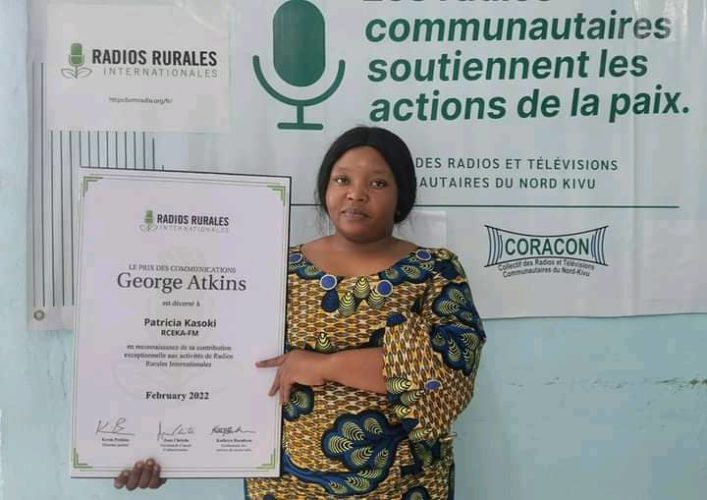Patricia Kasoki is a proactive, dynamic broadcaster at Radio communautaire et environnementale de Kanyabayonga (RCEKA-FM) in North Kivu, DRC, where she has worked for two years. Ms. Kasoki is curious by nature, with a passion for working with local communities, and says this is what motivated her to begin broadcasting. She is also a self-proclaimed feminist activist, and before beginning her own programs, she was often invited by other stations to speak on air about gender equality and to promote the rights of rural women.
Now Ms. Kasoki runs her own program called Badilika (Change) which she created to give rural areas the media attention she feels they deserve. Ms. Kasoki says her listeners are faced by many problems, including regional conflict and lack of access to land. As a result, farmers use protected park land—an area she says is under the control of armed groups—to cultivate their crops. Through Badilika, Ms. Kasoki educates her listeners about local land ownership laws so that they can influence policy and participate in decision-making about land development.
As a result of her program, Ms. Kasoki says that many farmers no longer try to cultivate protected land and are calling for land reform in DRC. Others have been inspired to run in upcoming local elections, or elect their farmer peers to office.
Her program also addresses land and resource access for marginalized groups and food sovereignty in an era of climate change.
To create the program, Ms. Kasoki interviews farmers in their fields and shares their good practices. In addition, she uses vox pops, phone-ins, and reads listeners’ SMS on air. Listeners who don’t have the credit to call in leave a missed call on the radio’s phone lines, and Ms. Kasoki calls them back at the radio station’s expense. She also features experts who offer specific technical guidance, and incorporates music, spots, and theatre to keep the program line-up engaging.
As a complement to the program, Ms. Kasoki created local listener groups. These groups include 30 people—a mixture of men, women, and youth of different ethnicities—who meet weekly to discuss the topic of the episode and identify topics for upcoming episodes. The groups also act as Village Savings and Loan Associations, and are a source of vox pops.
Badilika listeners tell Ms. Kasoki that they love the program, and often ask for it to be extended beyond its usual 30 minutes. They congratulate the show for airing relevant topics, and say the listener groups enable them to take ownership of the program.
Radio communautaire et environnementale de Kanyabayonga (RCEKA-FM) has been a Farm Radio partner since 2016. Ms. Kasoki says that Farm Radio is like a school for her, and she uses Farm Radio resources to create each episode of her program.
The Collectif des Radios et Télévisions Communautaires du Nord-Kivu (CORACON) celebrated Ms. Kasoki’s accomplishment as part of World Radio Day by awarding her the prize.
A report by Daniel Makasi, a journalist at Radio Tayna from Goma, can be found here (French only).


Comments are closed, but trackbacks and pingbacks are open.